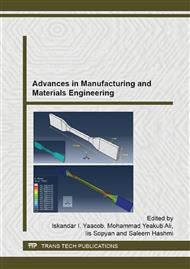p.568
p.573
p.578
p.585
p.589
p.596
p.601
p.606
p.610
Adoption and Adaptation of Japanese Manufacturing Management in an Automotive Company of Malaysia
Abstract:
This paper discusses the practices associated with Japanese Manufacturing Management (JMM) which can yield a superior competitive advantage in terms of productivity, quality and provide overall successful business performance. To examine the transfer of the best practices of the JMM locally and obtain the impact of the adoption and adaptation of the JMM, an in-depth case study was conducted in a Malaysian automotive company. This paper also discusses the changes in terms of the philosophy and practices undertaken by the automotive company and ascertain the impact of the JMM on its manufacturing and financial performances. The elements of business performance from the viewpoint of manufacturing based on safety, quality, cost and delivery were quantified and examined. All elements were quantified since the first year of the adoption and viewed over time to track the trend of achievement. The results show a positive impact to the automotive plant manufacturing performance. The results of the financial performance also show the profitability of the plant. The revenue has increased up to 92% after the JMM adoption whilst the net profit has increased from 5.33% to 8.15%.
Info:
Periodical:
Pages:
589-595
DOI:
Citation:
Online since:
July 2015
Keywords:
Price:
Сopyright:
© 2015 Trans Tech Publications Ltd. All Rights Reserved
Share:
Citation:


